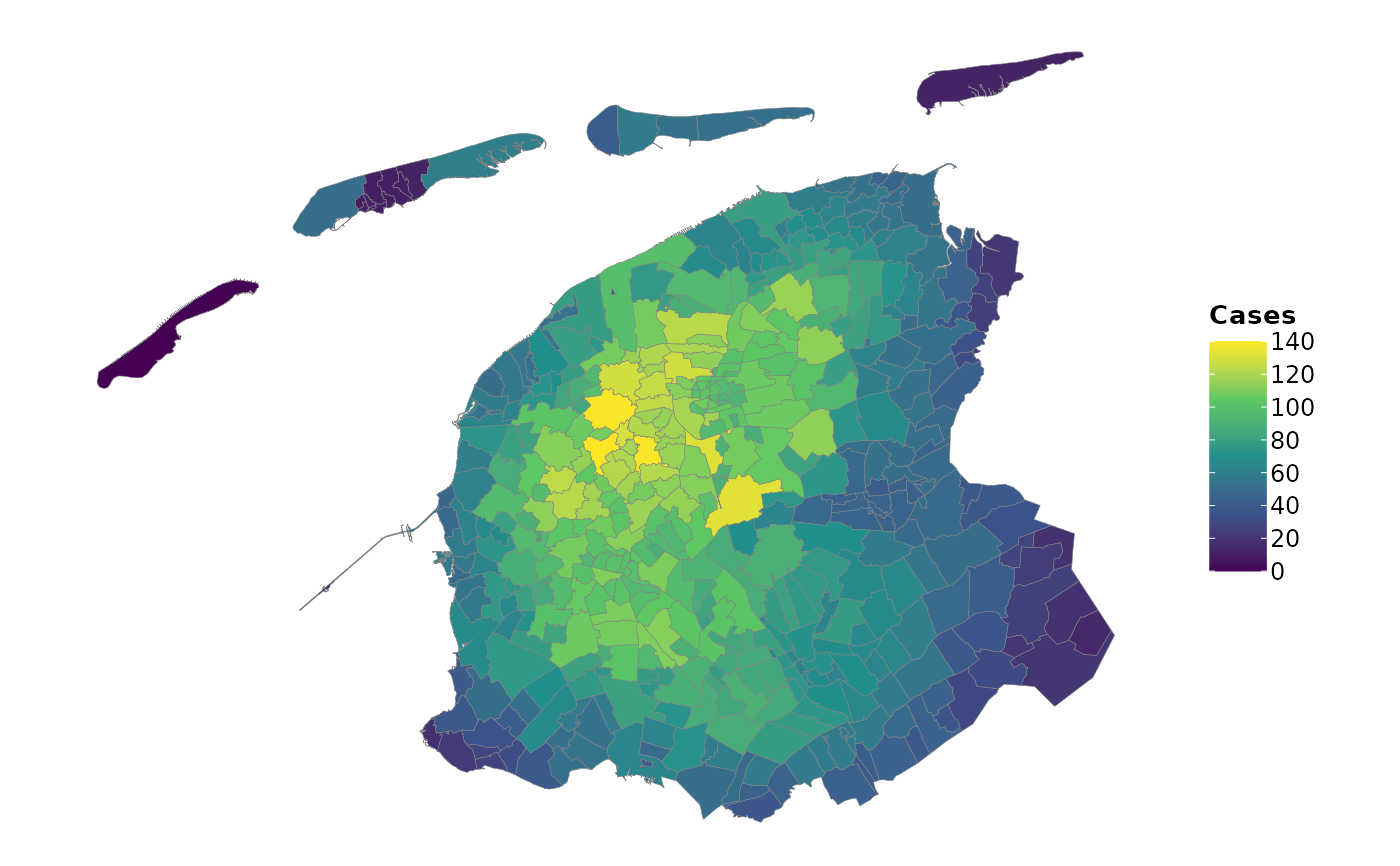Based on the postcodes4_afstanden data set, this function determines the specified minimum number of cases within a certain radius.
cases_within_radius(
data,
radius_km = 10,
minimum_cases = 10,
column_count = NULL,
...
)Arguments
- data
data set containing a column 'postcode'
- radius_km
radius in kilometres from each zip code. The search diameter is twice this number (since zip codes e.g. to the west and to the east are searched).
- minimum_cases
minimum number of cases to search for
- column_count
column name in
datawith the number of case counts, defaults to the first column with numeric values- ...
ignored, allows for future extensions
Value
This function adds two columns ("cases_within_radius" <dbl> and "minimum_met" <lgl>) to the input data.
Examples
library(dplyr, warn.conflicts = FALSE)
postcodes_friesland <- geo_postcodes4 |>
filter_geolocation(provincie == "Friesland") |>
pull(postcode)
# example with Norovirus cases:
noro <- data.frame(postcode = postcodes_friesland,
n = floor(runif(length(postcodes_friesland),
min = 0, max = 3)))
head(noro)
#> postcode n
#> 1 8388 0
#> 2 8389 0
#> 3 8391 1
#> 4 8392 1
#> 5 8393 0
#> 6 8394 2
radial_check <- cases_within_radius(noro, radius_km = 10, minimum_cases = 10)
#> Using column 'n' for cases_within_radius()
head(radial_check)
#> postcode n cases_within_radius minimum_met
#> 1 8388 0 30 TRUE
#> 2 8389 0 37 TRUE
#> 3 8391 1 37 TRUE
#> 4 8392 1 30 TRUE
#> 5 8393 0 35 TRUE
#> 6 8394 2 44 TRUE
# dplyr group support:
mdro <- data.frame(type = rep(c("ESBL", "MRSA", "VRE"), 20),
pc4 = postcodes_friesland[1:20],
n = floor(runif(60, min = 0, max = 3)))
mdro |>
group_by(type) |>
cases_within_radius()
#> Using column 'n' for cases_within_radius()
#> Analysing cases for group 1 out of 3 (n = 20)...
#> OK.
#> Analysing cases for group 2 out of 3 (n = 20)...
#> OK.
#> Analysing cases for group 3 out of 3 (n = 20)...
#> OK.
#> # A tibble: 60 × 5
#> # Groups: type [3]
#> type pc4 n cases_within_radius minimum_met
#> <chr> <dbl> <dbl> <dbl> <lgl>
#> 1 ESBL 8388 0 14 TRUE
#> 2 MRSA 8389 1 16 TRUE
#> 3 VRE 8391 0 5 FALSE
#> 4 ESBL 8392 2 12 TRUE
#> 5 MRSA 8393 2 15 TRUE
#> 6 VRE 8394 0 5 FALSE
#> 7 ESBL 8395 2 13 TRUE
#> 8 MRSA 8396 0 11 TRUE
#> 9 VRE 8397 2 3 FALSE
#> 10 ESBL 8398 1 7 FALSE
#> # ℹ 50 more rows
# plotting support:
if (require("certeplot2")) {
radial_check |>
add_map() |>
filter_geolocation(provincie == "Friesland") |>
plot2(category = cases_within_radius,
category.title = "Cases",
datalabels = FALSE,
colour_fill = "viridis")
}
#> Joining, by postcode
